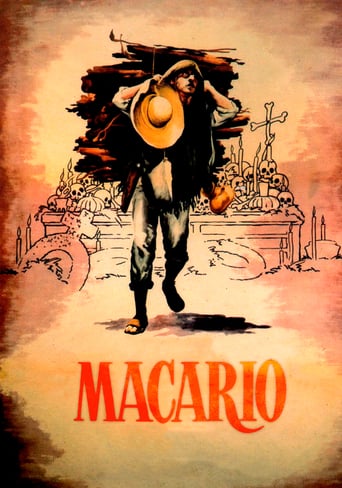albertoveronese
Writer B. Traven's, cinematographer Gabriel Figueroa's and film-director Roberto Gavaldón's 1960 masterpiece 'Macario' appears at first to be a wonder tail for children, a little fantasy - filled with marvelousness. But then, its poetry (albeit it never resigns from its esthetic) turns into a tragic dejection, and soon you realize that you are in the impossibility to step back. Life has trapped you, nobody looks out for you - death enters you when you're born, and you carry it around in your livers, your stomachs, your hearts. Each candle goes out by itself. 'Macario's daring and ruthless realism hits you sharply, suddenly - as with its first spoken dialogs and captivating scenes. All illusions, romances, sentimentalisms, understandings drop unexpectedly from your entrails and your skull... and surprisingly long time before your death.
Frances Farmer
This film, set in colonial times, tells the tale of Macario, a destitute woodcutter who stumbles onto a magical source of healing power. He has a series of beautifully photographed adventures curing the sicknesses of the incurable in his tiny farming hamlet and the nearby town. As Macario's fame spreads, his wealth increases but his uncanny powers attract the wrong kind of attention, leading to a tragic denouement.The powerless suffering of the poor, the boundless greed of the rich and of the poor alike, the eternal desire to cheat death and squeeze a few more drops out of this life -- these timeless themes are all operative here to good effect. This is not a subtle movie, and it is rather dated in its characterizations and its moralizing. Even so, the acting is competent and the plot engaging. There are some stunning scenes that combine with the first-rate cinematography to make the film lovely to look at.If this rarely screened movie comes your way, I recommend that you take the opportunity to view it.
valdezlopez
It is said that movie's were made to transport us out of our reality and immerse us in a different world.When watching Macario I'm happy to say that kind of magic has endured for this picture since 1960.It has been throughout almost than 45 years, the example of good Mexican cinema. It has a peculiar effect: this movie begins to make some distance from the happy, naive and joyful musical movies made in the Golden Years of Mexica cinema, nonetheless it still lacks the cynicism and irony of later films.Parallel to the main character behavior, beneath that surface of the plot and narrative, lies a fully formed story: Even though Macario speaks little, we know he thinks a reflects a lot.Igancio López Tarso made a classic with is quiet character, and I was amazed to find in Pina Pellicer one of the most beautiful women in Mexican movies.It is sad to see movies like this are no longer made. Mysticism has no place in Mexican cinema right now.(with a few... quite a few, and I mean quite a FEW -near to NONE- exceptions)
iF....
I know that Mexican cinema has suffered greatly from repulsive movie makers. Macario is probably "THE" Mexican film that will define the country's cinema at its best.Macario is a beautiful classic Mexican film about the tale of a poverty stricken woodcutter. Taking place when Mexico was still under Spanish rule (For the ignorant reader "a person from Spain!") and racism between Spaniards and Mexicans took place. The Spaniards are the holders of the moneymaking businesses, while the Mexicans do the work of the poor.A woodcutter by the name of Macario becomes frustrated of seeing rich people getting richer and the poor getting poorer. Macario becomes sick of being hungry all the time. He becomes determined to become rich to make himself and family happier. One day his wife steals a chicken for her husband Macario. He kindly accepts and takes it to the wilderness to eat by himself.On the way he encounters the devil dressed as a Mexican gunslinger. The devil asks Macario to share the chicken with him and in return, he will give all the land to Macario. Macario refuses and replies by saying "This is not your land, how can you give me something that is not yours". Macario continues deeper into the wilderness in hopes to eat his chicken in peace. He then comes across God disguised as a shepherd. God asks, "Could you please give me a small morsel of that chicken?" Macario replies "My lord, you do not need my chicken". Macario finally hides in a cave where he comes across another man who too asks for some chicken. Macario sees that the man has not eaten because he is so bony, so Macario kindly shares the chicken. As the two men finish the chicken, Macario notices that he has shared the wealth with "Death". Death is grateful and gives him a gift; a canteen filled with water that will cure any illness.This is one of the most symbolic movies I have ever witnessed. Not realizing that Mexicans could to great movies they have proved themselves greatly with this magnificent tale of religion, poverty, and wealth. One of the most memorable scenes is the valley of candles. Strong character development and the depressive themes makes this a tale that is not intended for the weak of heart. A true masterpiece for those who love tales of deals between good and the dark side of life. See this film in its Castilian tongue (for the ignorant reader "the official and literary language of Spain based on this dialect").


